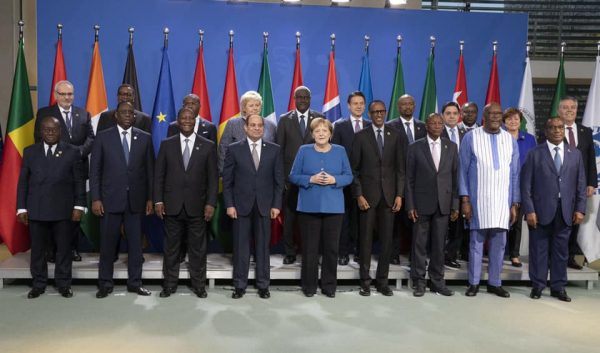The third edition of the Compact with Africa Summit is another major sign of the interest shown by the major economic powers in the continent.
By Abdourahmane Diallo and Oumar Dembélé
A dozen African heads of state and government were invited by Chancellor Angela Merkel to this meeting held on Tuesday and Wednesday in Berlin.
Thus, Germany is taking part in this rush to Africa since it does not intend to leave these “opportunities” to other economies, particularly those in Europe.
France-Africa, China-Africa, India-Africa, Japan-Africa, Iran-Africa, Turkey-Africa, Russia-Africa, Germany-Africa, etc. Africa attracts the world.
The continent, which until recently seemed to be on the margins of global attention, is now attracting interest from the major powers.
Even Germany, which has traditionally been discreet on the continent, is now getting in on the act.
With its “Compact with Africa” the third edition of which brought together Chancellor Angela Merkel and about ten heads of state and government of the continent earlier this week in Berlin, Europe’s leading economy intends to include Africa in its international priorities.
Since relations between states are above all informed by interests, what could this immense revival of global interest in Africa hide, of which the Berlin Summit is only the last obvious sign?
“It is obviously a question of interest that explains this flowering of summits. All these countries that meet with African heads of state are particularly attracted by the continent’s natural resources. They are looking to benefit from the best conditions of access to these resources and if possible to capture market share for their companies in Africa,” explained François Katendi, an economic journalist and director of the pan-African newspaper Afrique Expansion based in Paris.
Looking at the figures, the journalist may be right.
With its predominantly youthful population, the continent currently represents about 8 percent of the world’s oil reserves, 7 percent of gold, 53 percent of diamonds, 75 percent of platinum and at least 60 percent of uncultivated arable land.
But statistics do not tell the whole story.
“The strategic position is in favour of this interest from foreign powers, especially as African countries themselves are beginning to organise themselves, strengthen their institutions and adopt legal rules to regulate trade,” Moroccan academic Rachid El Houdaïgui, Professor of International Relations at Tangier University said.
According to this researcher at the Policy Center of the New South, a pan-African think tank based in Rabat, Morocco, “Africa is becoming globalized and these factors should not be overlooked in this new attention that foreign powers are giving to the continent.”
With regard to the Berlin strategy, which has “very well-defined objectives,” Professor El Houdaïgui argued that “the Germans are directing their financial support towards everything to do with renewable energy, the strengthening of decentralised actors in local authorities and everything to do with vocational education.”
What is Africa’s interest in all this?
“Africans must be careful. They must have a say and not let the Americans and their competitors free reing on conquered ground,” warned El Houdaïgui.
“Africa must be able to influence the nature of the relationships it wants to have with the rest of the world, African countries should not run and sign free trade agreements without prior studies,” he emphasised.
According to the Professor of International Relations, the organization of African states “is not yet sufficient” to take advantage of the various summits to which they are often invited.
The Moroccan expert reckons that Africans must develop “a spirit of the body according to the expression of the Tunisian medieval thinker Ibn Khaldun” that would prevent the great powers and multinational corporations from intervening “with the spirit of the one who is on conquered ground.”
To this end, Professor El Houdaïgui suggested that Africans adopt legal rules to protect themselves.
“What is missing in Africa and which African countries can focus their cooperation with the rest of the world on is institutional capacity building in various areas such as the appropriation of maritime space, the fight against piracy and terrorism,” he concluded.
Already 12 African countries have joined the Compact with Africa initiative including Benin, Burkina Faso, Cote d’Ivoire, Egypt, Ethiopia, Ghana, Guinea, Morocco, Rwanda, Tunisia, Togo and Senegal.
ARD/ODL/Dng/lb/as/APA


